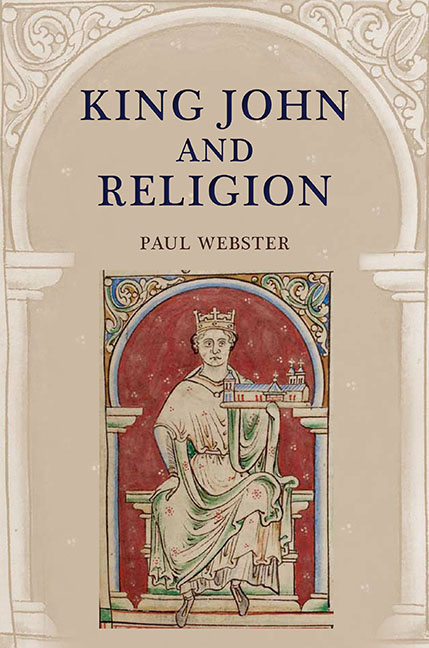Book contents
- Frontmatter
- Dedication
- Contents
- List of Illustrations
- Acknowledgements
- Abbreviations
- Introduction
- 1 The Mass
- 2 The Saints
- 3 Powerhouses of Prayer
- 4 Family
- 5 Charity and Almsgiving
- 6 Religion, Politics, and Reputation: The Interdict and King John’s Excommunication
- 7 Peace with the Pope: Diplomacy, Personal Religion, and Civil War
- 8 King John’s Deathbed and Beyond
- Conclusion
- Bibliography
- Index
- Other volumes in Studies in the History of Medieval Religion
6 - Religion, Politics, and Reputation: The Interdict and King John’s Excommunication
Published online by Cambridge University Press: 07 May 2022
- Frontmatter
- Dedication
- Contents
- List of Illustrations
- Acknowledgements
- Abbreviations
- Introduction
- 1 The Mass
- 2 The Saints
- 3 Powerhouses of Prayer
- 4 Family
- 5 Charity and Almsgiving
- 6 Religion, Politics, and Reputation: The Interdict and King John’s Excommunication
- 7 Peace with the Pope: Diplomacy, Personal Religion, and Civil War
- 8 King John’s Deathbed and Beyond
- Conclusion
- Bibliography
- Index
- Other volumes in Studies in the History of Medieval Religion
Summary
Despite his attendance at and provision for masses, his veneration of the saints, his religious foundations, provision for prayers for his wellbeing and for the souls of his relatives, and his almsgiving, King John is primarily remembered as a king who lacked respect for religion and the church. That this is the case is largely due to the long-running dispute over who would succeed Hubert Walter as archbishop of Canterbury. As with Richard I's dealings with the Church, ‘religious motives had no place’ in John's attitude to the dispute. He was concerned to protect what he perceived to be his rights. Nonetheless, ‘whilst it would be rash to accuse these kings of atheism or of denying the tenets of the Catholic faith’, John's ‘treatment of the English clergy and his reaction to the pope explain how his reputation in medieval historiography was formed’.
Archbishop Hubert Walter died in July 1205, depriving John of a lynch-pin of government and a principal religious advisor. The king reacted quickly, making ‘all speed to Canterbury’, where he adopted a conciliatory attitude. He ‘made arrangements concerning the archbishop's affairs in fatherly fashion’, and ‘said with sufficient kindness many things with the monks concerning the putting in place of another pastor’. The community had ‘no small hope’ that Hubert's successor would be one of their own.
If the Canterbury monks thought they would be allowed to choose a new archbishop, this quickly became the subject of contention. In July 1205, the election was postponed whilst the cathedral monks and the suffragan bishops of the archiepiscopal province of Canterbury appealed to Pope Innocent III to determine who had the right to elect Hubert's successor. The monks argued that this was their exclusive right. The bishops claimed precedent for their involvement. They had played a part in the elections of 1191 and 1193. John should have been aware of this. In 1191, he had acted alongside Walter of Coutances, archbishop of Rouen, in communicating King Richard's wishes to the assembled company. In 1205, he may have used the postponement to seek a papal guarantee that, when royal licence to elect was granted, the chosen candidate would receive Pope Innocent's approval.
- Type
- Chapter
- Information
- King John and Religion , pp. 131 - 152Publisher: Boydell & BrewerPrint publication year: 2015



